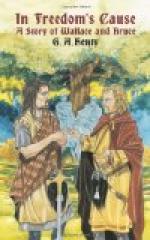This was the case, for the English were so hated that Archie had found that none would even in sport take that name, and the sides were accordingly dubbed Scots and Picts, the latter title not being so repugnant, and the companies changing sides each day.
“It looks as if you were fighting in earnest,” Roy said grimly, “for the blood is streaming down your face.”
“Oh, we don’t mind a hard knock now and again,” Andrew said carelessly. “I suppose, one of these days, we shall have to go out under Sir John’s banner, and the more hard knocks we have now, the less we shall care for them then.”
“That is so,” Roy said; “and some of you will soon be able to handle arms in earnest. Who are your leaders?” he asked sharply, as his eye fixed on Archie, who had seated himself carelessly upon a rock at some little distance.
“William Orr generally heads one side, and I the other.”
“And what does that young Forbes do?” Red Roy asked.
“Well, he generally looks on,” Andrew replied in a confidential tone; “he is not much good with the bow, and his lady mother does not like it if he goes home with a crack across the face, and I don’t think he likes it himself; he is but a poor creature when it comes to a tussle.”
“And it is well for him that he is,” Red Roy muttered to himself; “for if he had been likely to turn out a lad of spirit, Sir John would have said the word to me before now; but, seeing what he is, he may as well be left alone for the present. He will never cause trouble.” So saying, Red Roy strolled away with his companion, and left the lads to continue their mimic fight.
News travelled slowly to Glen Cairn; indeed, it was only when a travelling chapman or pedlar passed through, or when one of the villagers went over to Lanark or Glasgow, carrying the fowls and other produce of the community to market, that the news came from without.
Baliol was not long before he discovered that his monarchy was but a nominal one. The first quarrel which arose between him and his imperious master was concerning the action of the courts. King Edward directed that there should be an appeal to the courts at Westminster from all judgments in the Scottish courts. Baliol protested that it was specifically agreed by the Treaty of Brigham that no Scotchman was liable to be called upon to plead outside the kingdom; but Edward openly declared, “Notwithstanding any concessions made before Baliol became king, he considered himself at liberty to judge in any case brought before him from Scotland, and would, if necessary, summon the King of Scots himself to appear in his presence.” He then compelled Baliol formally to renounce and cancel not only the Treaty of Brigham, but every stipulation of the kind “known to exist, or which might be thereafter discovered.” Another appeal followed, and Baliol was cited to appear personally, but refused; he was thereupon declared contumacious by the English parliament, and a resolution was passed that three of the principal towns of Scotland should be “seized,” until he gave satisfaction. All this was a manifest usurpation, even allowing Edward’s claims to supremacy to be well founded.




